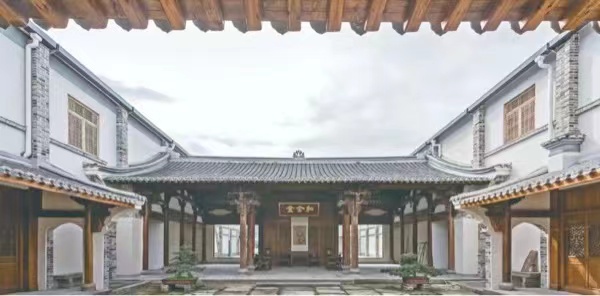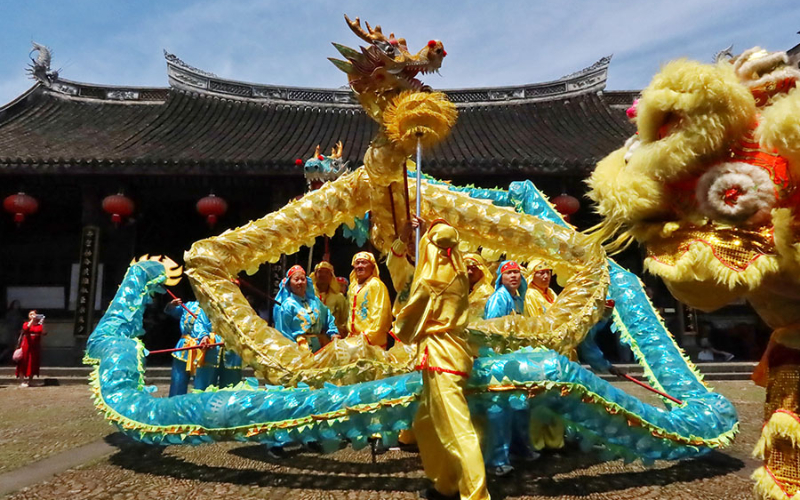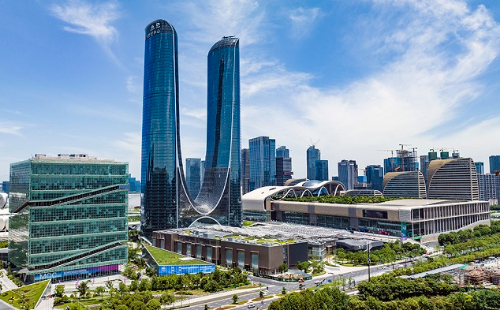Hehe culture thriving in Taizhou
Hehe culture is both historical and contemporary; it belongs to China and the world. In recent years, Hehe culture has been widely studied across China and becomes more influencing and beneficial to the society.
In Taizhou city, Zhejiang province, an action plan to build the city into the "holy land" of the Hehe culture has been proposed. According to the plan, Hehe culture will be thoroughly rooted in Taizhou and deeply integrated with the city by 2030. Its influence will also become more extensive and far-reaching, making Taizhou a real symbol of Hehe culture at home and abroad.

The Hehe Academy, the Tiantai County Intangible Cultural Heritage Museum, the Hehe Museum and other areas are set in the Hehe Cultural Park. [Photo provided to ezhejiang.gov.cn]
In November 2017, the Tiantai Mountain Hehe Culture Forum was held in Tiantai county, with nearly 200 experts and scholars from China, the United States, Japan, Korea, Thailand and other countries participating. At the forum, scholars discussed the role of Hehe culture in the construction of the "Belt and Road" and a community with a shared future for mankind.
In October 2019, the Taizhou "Cultural Integration" Summit and the Tiantai Mountain Hehe Culture Forum were held at the Tiantai Mountain.
A poem, an image, and an idea were the main elements of Hehe culture's initial publicity. Hanshan and his poems have had a profound impact on Chinese folk culture, which has also been spreading around the world.
In Japan, for instance, Hanshan can be seen everywhere. His poems and legends were introduced into Japan during the reign of Emperor Shenzong (1048-1085) in the Northern Song Dynasty (960-1127). Hanshan has had an important influence on Japanese literature, art and music, and his thoughts and images have long been engrained into the everyday lives of the Japanese.
In the 1950s, along with Zen Buddhism, Hanshan's poetry and his image spread from Japan to the United States. Since then, Hanshan's popularity, which lasted nearly 20 years, has influenced many American readers and writers.
In the middle of October 2018, the Canadian Hehe Culture Research Association was established in the "Land of Maple Leaf".
Zheng Yan, a native of Tiantai, is currently the executive vice-president of the Taizhou Clan Association in Japan.
On the afternoon of July 9, 2019, the award ceremony of China's first International Center of the Hehe Culture was held in Tokyo, Japan. Zheng received the plaque on behalf of the Taizhou Clan Association in Japan.
Zheng said that she did not know the relationship between Tiantai and Japan before, but only after arriving in Japan did she find out that her hometown had such a deep relationship with the country. The harmonious culture of Confucianism, Taoism and Buddhism not only belongs to Tiantai but also to the world. The International Center of the Hehe Culture in Tokyo has built a bridge for cultural exchanges between China and Japan, which will enable more Japanese people to understand it.
But the spread of Hehe culture is multi-dimensional and extends beyond geographical boundaries.
In August 2018, a musical called Tiantai Yuxianji (An Encounter with Immortals in Tiantai) premiered at the Music Theater of Tiantai Zhixiang Art Center. The musical was adapted from a folk legend which tells of a love story between two mortals and two fairies in the Tiantai Mountain.
Tiantai also launched the Hehe Yaji (or cultural fair), which is the most profound cultural experience for domestic and foreign tourists to learn about Tiantai Mountain culture.





